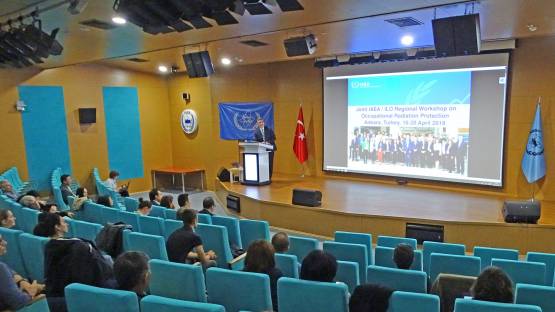Exposure to radiation can occur in many professions – in work associated with the different stages of the nuclear fuel cycle, for example, or when using radiation in medicine, scientific research, agriculture or industry. On 16-20 April 2018, 44 participants from 23 Member States in the Europe region have been trained to better protect workers in a regional workshop co-organised by the IAEA and the International Labour Organization (ILO). The event, which took place in Ankara, Turkey, was organized with the support of the Government of the Republic of Turkey through the Turkish Atomic Energy Authority.
The IAEA, in cooperation with the ILO and other international organizations, works closely with Member States on occupational radiation protection of workers (also known as “occupational” radiation protection), helping countries to adopt the best practices required to bring national regulations in line with the International Safety Standards.
The workshop enabled participants to improve their understanding of the specific requirements related to planned, emergency, existing exposure situations and the protection of workers in special cases. In addition, 23 country reports on the status of their national occupational radiation protection programmes were discussed, to identify strengths, good practices and possible enhancements through the application of the Safety Standards.
“Compliance with the requirements of the International Basic Safety Standards or identical national arrangements require unique approaches for implementation,” said Miroslav Pinak, Head of the IAEA’s Radiation Safety and Monitoring Section (NSRW). “A key issue is the implementation of occupational radiation protection with a graded approach to control, monitor and record of occupational exposure. As more and more occupationally exposed workers support modern life in different sectors, a reliable and sustainable system has to be introduced at national and international levels.”
General Safety Requirements, GSR Part 3, and the Safety Guide on Occupational Radiation Protection were the basis of the discussions and both are co-sponsored by the ILO.
Moreover, as Shengli Niu, Senior Specialist on Occupational Health of the ILO Office in Geneva said, “such workshops facilitate the implementation of the ILO Convention No. 115 on radiation protection by the ILO constituents,”. He added that “it also increases the impact of the relevant international policies on radiation safety and protection formulated by our both organizations.”






